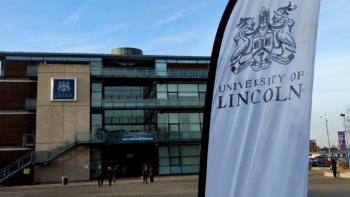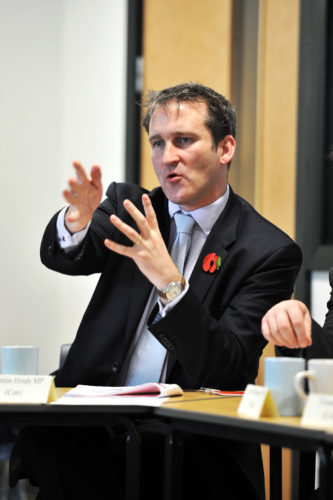The University of Lincoln has defended giving unconditional offers to applicants who make Lincoln their first choice of university – rejecting a Government instruction today telling them to stop doing so.

‘Conditional unconditional offers’ mean that if applicants make Lincoln their first choice, their offer to study at the university becomes unconditional – with Lincoln making over four thousand of these offers last year.
In a letter to the 23 UK institutions who make the offers, including Lincoln, the Education Secretary calls on them to stop the ‘unacceptable’ practice.
Damian Hinds said in a statement today: “It is simply unacceptable for universities to adopt pressure-selling tactics, which are harming students’ grades in order to fill places. It is not what I expect to see from our world-class higher education institutions.
“‘Conditional unconditional’ offers are damaging the reputation of the institutions involved and our world-leading sector as a whole. That is why I will be writing to 23 universities, urging them to stamp out this unethical practice.
“But I am concerned about the wider picture of how some universities are getting students through their doors, so I am asking the OfS to look at how well current admissions practices serve students and how they can be improved, so we can protect the integrity of our higher education system.”

Figures from UCAS show that the University of Lincoln made 4,380 ‘conditional unconditional’ offers last year, representing nearly 40% of all the offers they made in 2018.
But in a statement to The Linc, a University of Lincoln spokesperson defended the use of the offers, saying: “The University of Lincoln’s Unconditional Offer scheme was created to identify undergraduate applicants who we consider would excel at Lincoln and make a significant contribution to our community.
“As is good practice we have assessed the scheme carefully finding that the students who join us on this route have out-performed their peers.
“We do not put any applicant under any time pressure. We make clear to all our offer holders that they should take time to carefully consider all the offers they receive from different universities before making a final decision on their choice of institution and course.
“The University of Lincoln has a long track record in student retention, satisfaction and success and we will continue to strive to provide the very best opportunities for students with the potential to succeed at university.”
Indeed, a recent UCAS survey recently found that over 70 percent had a positive view of unconditional offers.
But the letter from Mr Hinds follows a similar warning from the universities regulator, the Office for Students (OfS), earlier in the year, who said they were concerned by the ‘rapid rise’ of all unconditional offers but particularly those with a ‘pressure selling’ element to them.
Mr Hinds has also asked the OfS today to carry out a comprehensive review of admission procedures at all UK universities.
Despite Lincoln’s decision, some universities have announced they will now stop making unconditional offers altogether.
Those universities include the University of Nottingham, the University of Sussex and St Mary’s University in Twickenham.
The Universities Minister, Chris Skidmore, said that ‘conditional unconditional offers’ were not in the best interests of students.
He said: “This excessive use of conditional unconditional offers is not in the best interests of students – and it is worrying to see such a major rise in their use across all subjects.
“I know there is a place for unconditional offers, but I expect universities to use them responsibly.
“They must not be used to place students in a position where they are forced to make choices before they know their respective options.
“Where institutions are not acting in the best interests of students the Office for Students should use their full range of powers to take action.
“The review of admissions practices will be an important moment for the sector to ensure the system works in the interests of students, and provides a truly accurate measure of performance for universities going forwards.”
The 23 universities told to stop making ‘conditional unconditional’ offers
- University of Roehampton
- Loughborough College
- Kingston University
- Sheffield Hallam University
- University of Brighton
- Birmingham City University
- Nottingham Trent University
- Bournemouth University
- Staffordshire University
- University of Lincoln
- University of Hertfordshire
- Royal Holloway, University of London
- Oxford Brookes University
- Lancaster University
- University of Birmingham
- Middlesex University
- University of Derby
- University of West London
- City, University of London
- Keele University
- University of Kent
- Aston University, Birmingham
- University of Surrey

